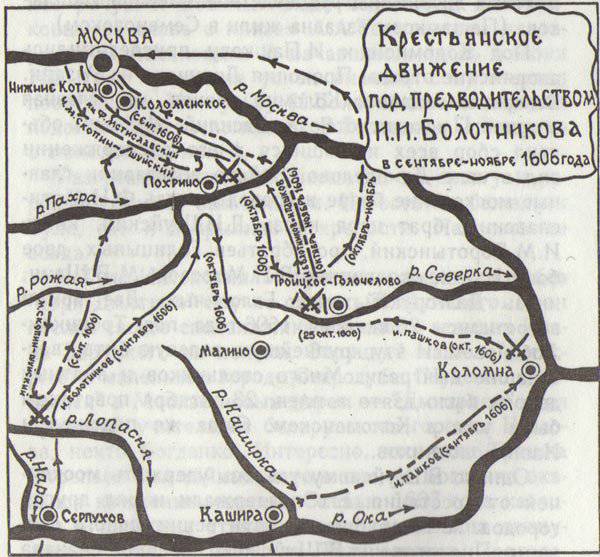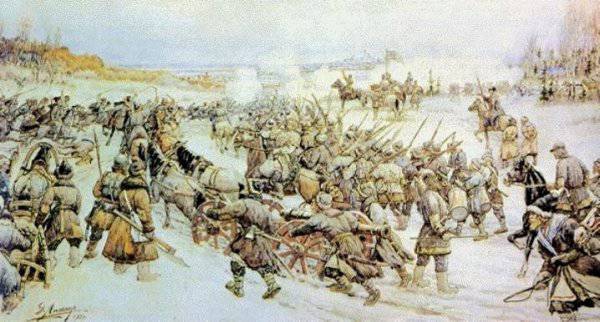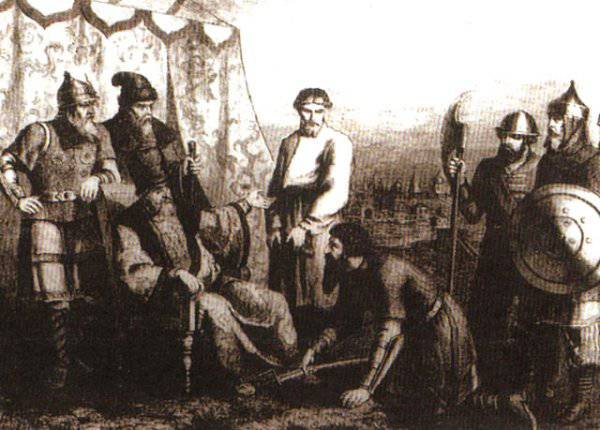Bolotnikov - the mysterious soul of the Russian rebel
The free Don Cossack — this is precisely how Ivan Isaevich positioned himself, participated in numerous military clashes, and was captured. For a long time he was in Turkish slavery in galleys, who again confronted him with military practice. After the capture of the ship on which Bolotnikov was an Italian sailor, Ivan Isaevich found himself in Europe and, having gained freedom, set off to travel, through Germany and Poland. The homeless, poor wanderer somehow interested Molchanov and the Mnishek family, as a result of which he returned to Russia as the envoy of the escaped prince or, as Molchanov calls story, False Dmitry II. In Ivan Isaevich, there was something inherent in all the great Russian rebels, it was this peculiarity of nature that fascinated him to the Don, and then brought him to Molchanov. Bolotnikov was gambling, he could not resist the temptation to put his life on the line in a game for the Russian throne and the untold riches promised by an impostor.
To assert that Bolotnikov did not know that “Tsarevich Dmitry” is far from being who he claims to be will be hypocrisy. He was a clever and cunning person who closely followed the development of events in his homeland. In addition, in Molchanov’s appearance, there was neither that royalty, nor the grandeur of the first impostor, nor the similarities with the noble and powerful Rurikovichs. Most likely, Ivan Isaevich understood that the heir, whom the Polish priests so honored, was only a protege of the nobility, but nevertheless decided to use the chance.
The organizational skills of Bolotnikov allowed him, in a short time, to create and arm an army. The money of the Polish gentry also played a significant role in the recruitment of insurgent detachments. Having collected the remnants of the military power of False Dmitry I, Ivan Isaevich directed his efforts towards raising indignant peasantry, attracting fugitives, Cossacks, among whom he had many acquaintances and friends. The position of the serfs has deteriorated significantly since the last of the Rurikovichs. The oppression grew harder: the reserved summer was canceled, enslaving slaves were forbidden to redeem their freedom and so on. The tormented Russia also remembered the uprising of the Cotton and the insane march of the first prince in the country and the massacre of him, as well as the Polish-Swedish occupation. Prince Shakhovsky, who actively supported Otrepyev, met fresh forces in the person of Bolotnikov with hope. Vasily Shuisky, who came to power, did not complain about the minions of the former sovereign, therefore the danger to the prince was quite real. The new uprising led by Ivan Isaevich, energetic and experienced in the art of war, was the only chance for Shakhovsky to regain his former influence and place in the capital's courtyard.
The forces of Bolotnikov were unprofessional warriors: runaway serfs, vagrants, robbers, peasants, who decided to defend their right to freedom. Commanders among such a contingent to find it was extremely difficult. The merit of military success of a small army belongs entirely to the vision, intelligence and tricks of Ivan Isaevich. A poorly armed crowd of illiterate peasants and serfs won a brilliant victory over the professional army of Trubetskoy and Vorotynsky. Villages and cities surrendered without a fight; supporters of the sovereign Shuisky were cruelly executed in front of the population. Bolotnikov practiced skillfully with fear, his people hung noble boyars by their feet, threw them from the tower, crucified them on crosses. The executions were bloody and perverse in nature, only the most desperate dared to resist his march to Moscow. It must be said that Ivan Isaevich was generous to his supporters, without giving an account, distributing the stolen wealth. However, the uprising was not exclusively peasant; Ryazan and Tula landowners were willingly joined Bolotnikov, disgruntled by the government of Shuisky and counting on a piece of cake in case of victory, as well as part of the free Cossacks.
The chronology of the rebellion is short. Starting at 1606, it ended the following year. And the leader of the uprising befell the fate of all Russian insurgents: he was executed by shameful and painful method. The beginning of the uprising was characteristic of the Russian riots. People were easily inspired and desperately fought with the tsarist army, due to which they achieved great results. All large groups adjoined the army, and unrest spread rapidly to the surrounding regions, covering all new areas of the country. The rebels steadily moved to Moscow and besieged it in early October.

The prolonged presence in the swampy and dank surroundings of the capital caused discontent in the rebel army, and a two-month fruitless siege undermined the belief in the success of the leader. Bolotnikov decided to retreat to Tula, as his army began to gradually melt. Here he connected with a new impostor, who named himself Tsarevich Peter. The real name of the second "prince" is known for certain, he was Eleyka Muromets, a Cossack from the Terek River. Together with Muromets Ivan Isayevich entered into a bloody confrontation with the armies of Shuisky.
At the end of June, the 100-strong royal army was defeated by the last forces of the rebels, and Bolotnik was given by his supporters. There is, however, information that Ivan Isaevich himself came to Vasily Shuisky and, kneeling down, offered him his loyal service and the right to punish his lush head. This historical event apparently took place in reality. During the entire uprising, Bolotnikov positioned himself as a faithful servant of Dmitry.
He told everyone about the oath given to them to the prince, and deliberately exaggerated his loyalty to the “true sovereign”.
Today it is very difficult to talk about the true feelings and intentions of this desperate but strikingly successful fugitive and crook. Some describe him as a valiant warrior and loyal servant of False Dmitry II. Someone argues that Bolotnikov, because of his ignorance, was in the dark about the fact that in Poland he was received by the unsaved prince, but an impostor. Still more convincing is the point of view that Ivan Isaevich knew perfectly well for whom he was fighting and understood his role in the uprising. Bolotnikov was, above all, a swindler and hoped to get his share of wealth and power, and he was not interested in the means of achieving the goal. He kept saying about his loyalty only to maintain the image of a loyal royal voivode. Bolotnikov did not care whom to serve, he was only interested in power, and that is why he offered his services to Shuisky. It was another attempt to get away from retribution and once again receive such a desired power.
The result of his amazing life, full of adventure, and the uprising that killed thousands of innocent lives, was blinding and drowning in the hole.


Information